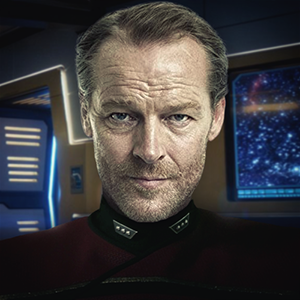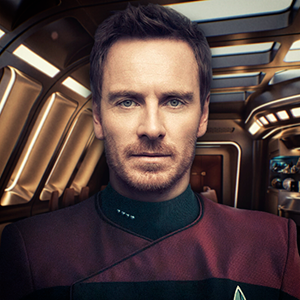Lieutenant Commander Grayson took a deep breath, trying to steady himself. He knew that planning for the deceased was a necessary and somber task, but it was one he had to face. He replied to Captain Wright, his voice steady but filled with empathy, “Understood, Captain. I will coordinate with the medical team and the ship’s mortician to establish a designated area for the deceased. We’ll ensure they receive the respect and care they deserve.”
Captain Wright acknowledged Grayson’s response, his voice filled with understanding. “Thank you, Grayson. I know it’s a difficult task, but it’s important that we honor our fallen comrades. Let me know if you need any additional resources or support.”
“Will do, sir,” Grayson replied. He knew he would have to rely on his training as a Starfleet officer and his compassion as a fellow crew member to handle this responsibility. He made a mental note to reach out to the counselors aboard the Valiant for guidance on providing support to the grieving crew members.
As the USS Valiant transitioned from its role as a starship to an aid vessel, the crew swiftly and efficiently repurposed the ship’s cargo bays into makeshift hospitals. Grayson recognized the urgent need for medical facilities to treat the wounded and provide essential care to the injured crews.
He didn’t know what to expect, but he already fely sick. In his career, he’d been there for many situations that called for medical assistance. Some mild, some major. This, he knew, would be the latter. The captain had already mentioned getting a make-shift morgue set up too. This alone had changed the atmosphere aboard the Valiant. The crew still worked diligiently, but there was a sorrow in the air that could be cut with a knife.
Grayson gathered the medical team and briefed them on the grim task at hand. He emphasized the importance of compassion, respect, and professionalism as they prepared the designated area for the deceased. He assigned a team of dedicated personnel, including the ship’s mortician, to handle the sensitive task of caring for the fallen crew members.
Throughout the ship, the crew worked tirelessly to convert the cargo bays into makeshift hospitals. They set up triage areas, medical stations, and recovery spaces, ensuring they had the necessary equipment and supplies to handle the influx of wounded personnel. Grayson coordinated with the medical staff to divide their resources efficiently, considering the severity of injuries and the need for immediate attention.
As the medical facilities took shape, Grayson made his way to the designated area for the deceased. It was a solemn place, with dimmed lights and an air of reverence. He observed as the mortician and the designated team prepared the area with care and dignity, ensuring that each fallen crew member would be treated with the utmost respect.
Grayson approached the team and spoke softly, acknowledging the weight of their task. “Thank you for your dedication in carrying out this difficult duty. I know it is not easy, but it is important work. We owe it to our fallen comrades to honor their memory.”
The mortician, a seasoned officer with years of experience, nodded in acknowledgment. “I understand, sir. We will handle this responsibility with the utmost care and reverence. The fallen will be treated with dignity.”
Grayson spent a moment in silence, reflecting on the sacrifices made by the brave crew members who had lost their lives in the battle as the body bags began materialising as they were trasnported in. He reminded himself of the importance of their mission—to provide aid and support to the wounded and to honor the memory of those who had given their lives in service to Starfleet.
Returning to the nearest makeshift triage centre, he watched as the wounded began to materialise. Some arrived on stretchers, their bodies limp and battered, while others managed to walk with visible effort, their faces etched with pain. The air filled with moans and cries
One crew member materialized with a fractured arm and severe burns on her face and hands. She grimaced in pain, her breath shallow as she clutched her injured limb. The medical team quickly surrounded her, gently stabilizing her arm and assessing the extent of her burns. They administered pain medication and began the delicate process of cleaning and dressing her wounds.
A few meters away a crewman, supported by two medical officers. His leg was mangled, blood staining his uniform. Despite his evident agony, he managed to maintain a stoic expression, gritting his teeth to suppress his cries. Grayson approached him, his voice filled with empathy. “Crewman, you’re in good hands. We’re going to do everything we can to relieve your pain and mend your leg.”
In another corner of the makeshift ward, a security officer was beamed aboard with multiple shrapnel wounds across her chest and abdomen. Her breathing was rapid and shallow, indicating possible internal injuries. The medical team surrounded her, their focused expressions reflecting the gravity of the situation. They worked swiftly to assess her condition, providing oxygen support and initiating measures to stabilize her vital signs.
Amidst the chaos, the medical staff remained composed and efficient, their expertise and training guiding their actions. They applied bandages, administered pain medication, and triaged the wounded based on the severity of their injuries. The sound of medical equipment beeping and the hushed voices of medical personnel filled the air, intermingled with the occasional cry of pain.
Grayson moved through the makeshift ward, observing the tireless efforts of the medical team. He witnessed acts of compassion and determination as they worked to save lives and alleviate suffering. The crew members, despite their own exhaustion, maintained a sense of purpose and professionalism in the face of the overwhelming task before them.
In the midst of the flurry of activity, Grayson caught sight of a young ensign lying on a bed, his face pale and his breathing labored. He had sustained critical injuries, and the medical team surrounded him, frantically working to stabilize his condition. Grayson approached the ensign, his heart heavy with concern.
“How are we doing here?” Grayson asked one of the doctors, his voice filled with urgency.
The doctor looked up, sweat glistening on his forehead. “It’s touch and go, sir. We’re doing everything we can, but his injuries are severe. We’re fighting to keep him stable.”
Grayson nodded, his gaze fixed on the ensign. He could see the determination in the doctor’s eyes and the unwavering commitment of the medical team. They refused to give up, even in the face of overwhelming odds.
Grayson continued to offer support and assistance wherever he could. He helped to organize the flow of patients, ensuring that those in critical condition received immediate attention. He comforted crew members, both from the battle group and the Valiant.
Despite the exhaustion and the mounting emotional toll, Grayson remained resolute. He drew strength from the resilience of his fellow crew members and the knowledge that they were making a difference, saving lives and providing comfort to those in need.
Another injured crewman beamed in. Grayson caught sight of his face. It seemed familiar. It took a moment for Grayson to register who it was. The man’s uniform was torn, his face smeared with dirt and sweat, and his right arm held in a makeshift sling and immediately trying to help other injured crewmen. This was Captain Ramirez of the USS Vanguard. Grayson hurried over to him, concern etched on his face.
“Captain Ramirez, you should be resting,” Grayson said, his voice filled with genuine worry.
Captain Ramirez smiled weakly, his eyes reflecting the weariness of his ordeal. “I appreciate your concern, Lieutenant Commander, but I couldn’t just sit back while our crew members are in need. I’m doing what I can to assist.”
Grayson nodded, understanding the captain’s determination to be there for his crew. “Your presence is invaluable, Captain. Let us take care of you and ensure you receive proper medical attention.”
Ramirez hesitated for a moment, then nodded, realizing the importance of setting an example for his crew. “Very well, Grayson. Lead the way.”
The transporter beam shimmered, and amidst the chaos of the makeshift triage center, a crewman materialized with life-threatening injuries. His body was mangled, blood-soaked clothing clinging to him in tatters. The medical team’s faces tightened with a mix of determination and concern as they quickly assessed the severity of his condition.
His breathing was labored, his vital signs fluctuating dangerously. The crewman’s complexion paled, and his hand trembled as he struggled to speak. The medical staff sprang into action, their tricorders scanning the injuries, analyzing the severity and damage.
Nurse Talia, a dark-haired Bajoran woman, took charge, her voice firm and resolute. “Prepare a dermal regenerator and activate the biobed. We need to stabilize him quickly.”
As they worked tirelessly, the crewman’s eyes fluttered open, reflecting pain and uncertainty. His voice quivered as he asked, “Can you save me?”
Talia met his gaze with empathy, her voice laced with determination. “We’re giving it everything we’ve got. Hold on, we won’t give up.”
The medical team used advanced medical instruments, such as osteo-regenerators and tricorder-guided suturing devices, to mend shattered bones and close lacerations. Their tricorders emitted soft beeps and chirps, relaying vital information and guiding their interventions.
Despite their best efforts, the crewman’s condition continued to deteriorate. His body weakened, and his grip on life grew increasingly tenuous. As the crewman’s life force waned, his breathing became shallower, and his hand reached out weakly, seeking solace. The medical team encircled him, their expressions a mix of compassion and determination, refusing to surrender in the face of defeat.
Talia locked eyes with the crewman, her voice filled with a gentle resolve. “You’re not alone. We’re here, fighting with you until the end.”
In a final act of desperation, the medical team administered a powerful neuro-regenerative treatment, attempting to stabilize his failing neural patterns. But the signs of life slipped away, fading into the void.
A hushed reverence fell over the room as the crewman’s vital signs flatlined, signifying the irrevocable loss. The medical team stood in solemn silence, their hearts heavy with grief and the weight of their inability to save him.

 Bravo Fleet
Bravo Fleet












